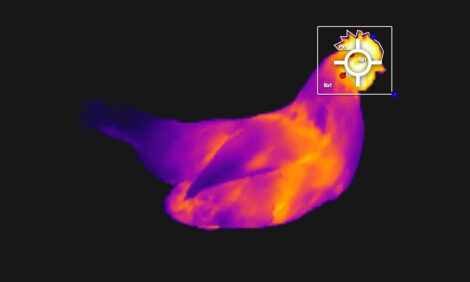



Reducing Salmonella Horizontal Transmission During Egg Incubation by Phage Therapy
The application of bacteriophages by aerosol spray while transferring eggs from incubator to hatcher may be an effective and inexpensive approach to reduce the horizontal transfer of Salmonella in poultry, according to new research from Portugal.Salmonella is a serious problem for both animal production and public health worldwide, according to Ana Henriques of the University of Aveiro in Portugal.
In a paper published online in Foodborne Pathogens and Disease, she and co-authors from Controlvet explain that contaminated poultry is the main vehicle of Salmonella and the most important serotype is Salmonella enterica serovar Enteritidis.
In order to test the efficiency of bacteriophages to treat Salmonella enterica serovar Enteritidis infections in poultry, a cocktail of two phages, F1055S and F12013S, isolated from chicken litter was applied by aerosol spray on fertile eggs challenged with Salmonella Enteritidis.
To the best of the researchers' knowledge, this is the first experiment in which phages were applied by spray on fertile eggs.
Two groups of eggs were challenged with Salmonella (3×108 colony-forming units (CFU) per mL) and one of them was treated with the phage suspension (2×106 plaque-forming units (PFU) per mL). A third group was used as non-challenged and non-treated control.
The phage treatment of challenged Salmonella eggs reduced the disease symptoms in the chicks. The arthritis and pasting after eight days in the challenged and treated group were similar to those normally occurring in chicks (non-challenged and non-treated chick control group; p=1.000 and p=0.828, respectively, for arthritis and pasting) and were significantly lower than the challenged but non-treated ones (p=0.017 and p=0.002 for arthritis and pasting, respectively).
The phage-treated group did not lose weight, showing an average weight similar to that of the non-challenged control group and higher than that of the challenged non-treated group.
The results of this study suggest that the application of phages by aerosol spray during the transfer of the eggs from incubators to hatchers may be an effective and inexpensive approach for reducing the horizontal transfer of Salmonella in poultry, concluded Henriques and co-authors.
Reference
Henriques A., R. Sereno and A. Almeida. 2013. Reducing Salmonella horizontal transmission during egg incubation by phage therapy. Foodborne Pathogens and Disease. -Not available-, ahead of print. doi:10.1089/fpd.2012.1363
Further Reading
You can view the full report (fee payable) by clicking here.
Find out more information on Salmonella enteritidis by clicking here.
May 2013








